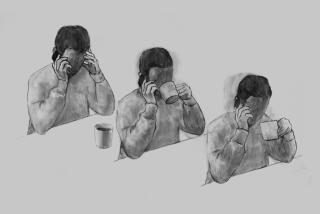‘Sicko’ is just what the doc ordered
- Share via
NO one ever accused Michael Moore of not having a point of view.
A master propagandist and disturber of the peace with an eye for pretense and hypocrisy, Moore can orchestrate outrage pro and con like no one else. It wasn’t an accident that his “Fahrenheit 9/ll” was the highest-grossing documentary of all time; it was business as usual.
Moore is back again examining America’s healthcare system in the aptly named “Sicko.” It’s likely his most important, most impressive, most provocative film, and it’s different from his others in significant ways.
For one thing, Michael the Confronter, the man who relished face-to-face encounters with the rich and powerful, is no longer in evidence. “I wasn’t in the mood to do that, it was not where my head has been at,” the director said at his Cannes news conference. “I became tired of yelling and screaming, not getting anywhere.”
Rather than irritate people, what Moore wants to do is have an impact on policy and in an area that touches more Americans more directly than any other he’s examined. In fact, one of the challenges “Sicko” faces is that concerned citizens may feel they’ve heard enough on the healthcare debate to last a lifetime.
One of Moore’s gifts, however, is the ability to go over familiar territory in his own unmistakable way, to turn dry policy issues into powerful emotional appeals. A tireless researcher (undoubtedly backed by a hard-working staff) and a master deployer of anecdotal evidence, Moore knows if he did it like everyone else, no one would be listening.
A key to Moore’s technique is his folksy, faux-naive persona, complete with puzzled looks a silent-film star would envy and a way of asking disingenuous questions he already knows the answers to in a voice that plays with listeners the way Heifetz played the violin.
Moore also has a gift for intuitively understanding how to orchestrate the situations reality provides. Much has been written, for instance, about his taking a handful of 9/11 rescue workers to Cuba for their medical care, but the actual gambit is considerably more sophisticated. After seeing extensive news footage of government officials boasting about the fabulous healthcare Al Qaeda detainees are receiving, Moore heads not for Cuba per se but for the notorious prison at Guantanamo Bay.
“We don’t want any more care than you’re giving the evildoers,” he intones piously through a megaphone at Guantanamo’s watery entrance. “Just the same.”
And though pre-release news stories assumed that “Sicko” would be little more than a compendium of healthcare horror stories, Moore in fact has broader points in mind. He believes that profit-driven healthcare is a system that dehumanizes everyone it touches. And it’s not working particularly well, either, placing our level of care at No. 37 in the world, “just slightly ahead,” Moore says in that disbelieving voice, “of Slovenia.”
Before he gets to those broader points, Moore does take a bit of time to set the scene. He gives a nod, complete with anecdotes about the dollars-and-cents price paid for severed fingers, to the 50 million Americans with no health insurance.
Then he moves on, with heavy irony, to “those of you who are living the American dream,” namely the 250 million citizens who do have health insurance. As Moore documents with grim examples, these people can have such extreme difficulty actually getting their companies to pay their bills that even the people doing the denying are sometimes moved to tears.
Curious how we Americans, “a good, generous people,” got to this point, Moore takes a brief detour into the politics of healthcare, focusing on the great number of members of Congress -- including Hillary Clinton, whom he first applauds and then derides -- who accept huge campaign contributions from the healthcare industry.
Finally, and this is the true focus of the film, Moore takes in-person trips to Canada, Britain, France and Cuba, showing once again through examples how both patients and care-givers seem to thrive in countries where, as one patient puts it, “you don’t have to bring a checkbook when you go to the hospital.”
Though he doesn’t confront anyone, Moore’s amusing presence in these scenes -- for instance, searching tirelessly for a cashier in a British hospital only to find that its purpose is to pay patients’ travel expenses -- give this section its biting humor.
What Moore is doing with many of these anecdotes and interviews is countering what he considers to be the domestic myths that have grown up around government-sponsored healthcare, such as the idea, a favorite of Ronald Reagan’s in his pre-presidential days, that it was the first step toward a communist takeover. (Not quoted but called to mind by all this was a college professor of mine who liked to remind students that the earliest universal healthcare in Europe came courtesy of “that notorious creeping socialist, Otto von Bismarck.”)
Obviously, Moore is being selective about the situations he shows us, but his point -- that there is another side to this contentious issue than the one we usually hear -- is difficult to ignore.
We would be horrified, the filmmaker insists, if the police and fire departments were forced to make profits, so why should healthcare have to go down that difficult road? We Americans inevitably feel we know the best way to do everything, but the great accomplishment of “Sicko” is that it is difficult to watch this slyly confrontational film and remain sure.
“Sicko” MPAA rating: PG-13 for “brief, strong language.” Running time: 1 hour, 56 minutes. In general release.
More to Read
Only good movies
Get the Indie Focus newsletter, Mark Olsen's weekly guide to the world of cinema.
You may occasionally receive promotional content from the Los Angeles Times.









